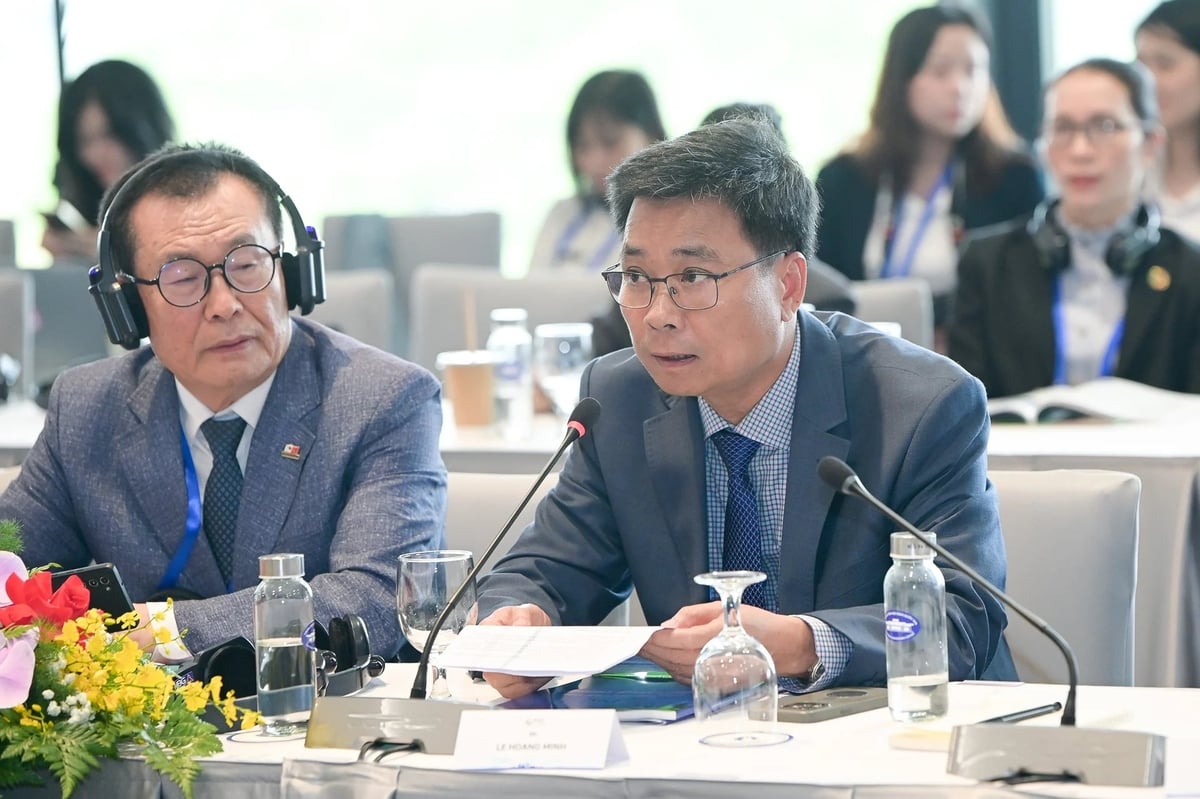December 5, 2025 | 05:16 GMT +7
December 5, 2025 | 05:16 GMT +7
Hotline: 0913.378.918
December 5, 2025 | 05:16 GMT +7
Hotline: 0913.378.918

Le Hoang Minh – Executive Director of Production and Head of the Net Zero Project at Vinamilk. Photo: Tung Dinh.
At the ministerial session themed “Riding the Wave of Green Revolution 4.0: Transforming Food Systems for a Sustainable Era,” Le Hoang Minh, Executive Director of Production and Head of the Net Zero Project at Vinamilk, shared the company’s efforts in energy transition within its production processes. As the largest dairy enterprise in Vietnam, Vinamilk is not only committed to achieving its own sustainability goals but also hopes to inspire other businesses, partners, and communities across the dairy and livestock sector in Vietnam. Its vision is not limited to internal operations but extends to shaping an industry-wide shift towards greener practices.
Vinamilk has set clear targets: reducing emissions by 15% by 2027, 55% by 2035, and achieving Net Zero by 2050. The company is currently working with the Science-Based Targets initiative (SBTi) to develop scientifically grounded goals, measurement methods, and a detailed roadmap.
A variety of practical measures have been implemented to improve energy efficiency and shift towards green, clean energy sources. At Vinamilk’s farms, rooftop solar panels have been installed, and a biogas circular system treats waste from dairy herds, converting it into gas and organic fertiliser. This fertiliser is reused on farms and supplied to smallholder farmers who collaborate with Vinamilk.
In 2023, Vinamilk obtained the PAS 2060:2014 international carbon neutrality certification for three facilities - two factories and one farm. This marked a significant step towards its Net Zero ambition. With ISO 14068 set to become the international standard for carbon neutrality from 2025, Vinamilk is among the pioneers upgrading its systems to align with this new standard. The company expects to complete the ISO 14068 certification process by May 2025.
Vinamilk is also the first Vietnamese enterprise to support the global Net Zero initiative for the dairy industry - “Pathway to Dairy Net Zero 2050.” This initiative aims to unite dairy companies worldwide in the shared goal of achieving carbon neutrality by 2050. Currently, all 13 of Vinamilk’s factories are powered by renewable energy sources, including solar, biomass, and compressed natural gas (CNG). Green energy now accounts for more than 88.8% of the total energy used in production. All plants are certified to ISO 50001 for energy management, ensuring optimised energy use and reduced greenhouse gas emissions.

The solar power system installed at Vinamilk’s factories. Photo: VNM.
A standout example is Vinamilk’s “Mega Dairy Plant” in Binh Duong, which operates with green energy, advanced automation lines, and integrated thermal and water circulation systems. These features help conserve energy and minimise environmental impact. Notably, 60% of energy is saved by using LGV robots to transport goods instead of traditional forklifts. Vinamilk’s four smart warehouses (including chilled storage) reduce energy consumption by 70% compared to conventional warehousing models. These innovations not only enhance operational efficiency but also demonstrate the scalability of sustainable practices within the manufacturing sector.
To ensure transparency and efficiency in its emissions reduction roadmap, Vinamilk promotes the adoption of international standards such as Global GAP and EU Organic for farms; ISO 50001 for energy management; PAS 2060:2014 and, soon, ISO 14068 for carbon neutrality; and ISO 14064 for greenhouse gas inventory. Building an accurate emissions and carbon footprint database enables the company to identify its current status and clearly plan effective emission reductions.
Beyond internal improvements, Vinamilk actively shares its experience and collaborates with domestic and international partners. The company has worked with global organisations to develop a science-based emissions reduction roadmap, while encouraging other businesses in the sector to adopt sustainable standards and practices. It regularly engages in industry dialogues, knowledge exchanges, and international forums to advocate for climate-resilient development.
With a clear strategy, strong commitment, and concrete actions, Vinamilk is leading the way in green transformation and working towards the Net Zero goal by 2050. Its achievements not only reinforce the company’s position within the dairy industry but also contribute meaningfully to Vietnam’s and the global community’s sustainable development objectives.
The adoption of circular economy models, renewable energy, and advanced technologies not only supports Vinamilk’s environmental goals but also improves production efficiency and product quality. These efforts strengthen Vinamilk’s presence in international markets and drive the sustainable growth of Vietnam’s dairy industry, positioning the company as a role model in responsible business practices.
Translated by Huong Giang
/2025/12/01/2936-2-222331_70.jpg)
(VAN) Mortgaging his house and giving up a pharmaceutical management career, Mr. Nguyen Quang Duy succeeded in bringing Khanh Hoa's sea grapes to demanding markets such as Japan and the U.S.

(VAN) The large-scale agroforestry investment project aims to develop a leading sustainable agro-industrial center in Angola.
/2025/11/28/3433-1-212821_213.jpg)
(VAN) Many localities across the coconut land of Vinh Long are replicating emission-reducing models in production and daily life, contributing to the targets for emission reduction and green economic development.

(VAN) The green transition is an inevitable path for collective economy to achieve balanced growth and align with global trends.

(VAN) The TH Group is not only Vietnam’s leading clean-milk producer; it is also leaving a strong mark on sustainable development as it pursues the goal of carbon neutrality.
/2025/11/27/3830-1-152901_403.jpg)
(VAN) Dong Nai is developing its key crop areas, expanding planting area codes, and applying high technology to increase the value of agricultural products, aiming at a green and sustainable agriculture.

(VAN) Tay Ninh’s livestock sector is undergoing a major transformation, applying high-tech, closed-loop circular models to build sustainable value chains.